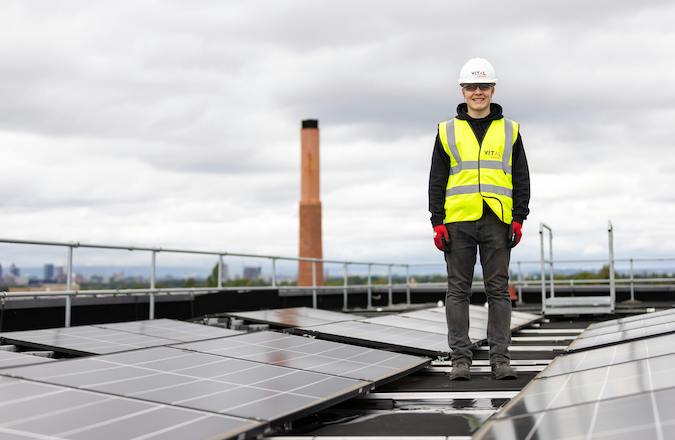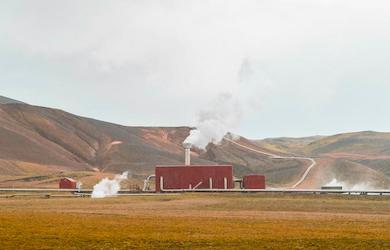The skills and capacities of the labour market is highlighted as one of the core pillars in achieving a swift renewable energy transition.
What is the renewable energy skills gap?
At COP28, 116 countries worldwide signed the Global Renewables and Energy Efficiency Pledge, which agreed to triple worldwide installed renewable energy generation capacity to at least 11,000 GW by 2030 [1]. Global targets such as this are increasingly ambitious, and the subsequent upsurge in renewable developments cannot take place without a specialised workforce with expertise in engineering, environmental science, and technology [2]. Currently, there is a gap between the pool of skilled workers readily available and the demands of the renewable energy sector.
In 2021, the International Energy Agency (IEA) set out predictions of labour requirements to help inform policy makers. In the pathway set out in the IEA’s Net-Zero Emissions by 2050 (NZE) Scenario, an estimated 14 million new jobs would be generated in energy supply by 2030. Over the same period, fossil fuel production could lose 5 million positions, resulting in a net gain of 9 million [3]. However, in the few years since these figures surfaced, it appears that demand for skilled workers is growing exponentially. There is also a significant risk of job displacement, most likely to affect economies that currently rely heavily upon fossil fuel supply, and in countries where there is no immediate investment to ramp up renewable supply.
Last month, during the 2024 European Sustainable Energy Week (EUSEW) held in Brussels, the Renewable Energy Skills Partnership hosted a session: ‘The role of Net-Zero Academies in developing renewable energy skills’. Concerns have re-emerged that current national policies are falling short on providing incentives for prospective workers to enter green careers. The session set out the following shortages in renewables within the European labour market:
- 180,000 skilled workers needed in fuel cell hydrogen manufacturing
- 66,000 skilled workers needed in photovoltaic solar manufacturing
- 800,000 skilled workers needed in battery production [4]
Clean energy industries – such as efficiency, automotive and construction – would require a further 16 million workers. This means a total of more than 30 million jobs could be created in clean energy, efficiency and low-emissions technologies by 2030 [3]. These include freshly created jobs, for example due to efficiency upgrades. They also include new roles for existing workers in construction, in the manufacturing of emissions-reducing products like EVs and hyper-efficient appliances, and in innovative technologies such as hydrogen. These figures do not consider the service roles that support the clean energy sector.

Figure 1. Newly qualified engineer amongst rooftop solar PV. [5]
What consequences does a skills shortage hold for the energy industry?
Economic Impact:
The energy sector is a cornerstone of any modern economy. An inadequately skilled workforce can lead to reduced productivity and competitiveness on a global scale. Furthermore, vacancies that remain unfilled due to skills shortages can result in economic losses as the sector struggles to meet demand.
Increased Costs:
A shortage of skilled workers in the energy sector often leads to project delays and reduced efficiency, which in turn can increase the costs of energy production. These increased costs can be passed down to consumers in the form of higher energy bills, affecting individuals and businesses alike.
Limited Innovation:
A shortage of skilled professionals hampers the development and implementation of new technologies. The energy sector is in constant need of innovation to improve sustainability, reduce emissions, and increase efficiency. An insufficient talent pool means that these important technological advancements may be slowed or halted altogether.
Sustainability Goals Compromised:
Many countries have ambitious targets for transitioning to renewable energy and reducing carbon emissions. A shortage of skilled workers in areas like solar and wind energy, battery technologies, and smart grids can significantly hinder progress toward these important sustainability goals.
Conclusions
Despite being present within policy and business literature for the past few years, the energy skills gap is set to be an ongoing concern whilst global annual investments in renewable energy continue to grow. This skills shortage is a complex issue that holds significant implications, not just for the expansion of the renewable energy sector, but for meeting the initiatives set by global governments to rapidly reduce emissions to protect the longevity of our planet. Closer attention is required by governments and academies to create attractive outcomes for individuals considering green career pathways. There is also a balance to strike in ensuring that job creation is balanced geographically and support economies that are heavily reliant on fossil fuels or otherwise in need of reshaping.
Stay tuned for the second instalment on renewable energy skills, which will explore some of the solutions that are emerging in response to continually increasing labour demand. A key pillar of this work is understanding and managing shifts in energy employment that are already underway in many regions around the world, bringing into focus lessons that can be shared among policy makers.
About Pager Power
Pager Power undertakes technical assessments for developers of renewable energy projects and tall buildings worldwide. For more information about what we do, please get in touch.
References
[1] COP28. (2023). COP28 Presidency launches landmark initiatives accelerating the energy transition, Last accessed: 26/07/2024, Available at: https://www.cop28.com/en/news/2023/12/COP28-Presidency-launches-landmark-initiatives-accelerating-the-energy-transition
[2] Smith, S. (no date). Skills Shortage for the Energy Industry, People with Energy, Last accessed: 26/07/2024, Available at: https://www.peoplewithenergy.co.uk/news/skills-shortage-for-the-energy-industry#:~:text=Many%20countries%20have%20ambitious%20targets,toward%20these%20important%20sustainability%20goals
[3] Cozzi, L. & Motherway, B. (2021). The importance of focusing on jobs and fairness in clean energy transitions, IEA, Last accessed: 26/07/2024, Available at: https://www.iea.org/commentaries/the-importance-of-focusing-on-jobs-and-fairness-in-clean-energy-transitions
[4] EUSEW. (2024). The role of Net-Zero Academies in developing renewable energy skills, Last accessed: 26/07/2024, Available at: https://interactive.eusew.eu/eusew-2024/sessions/6153fe72-4815-4c37-b65c-02b19aa352cc
[5] Pexels. Last accessed: 26/07/2024, Available at: https://www.pexels.com/photo/engineer-standing-among-solar-panels-19895867/



